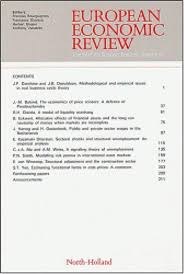
Onderstal, S. (2009). Bidding for the unemployed: an application of mechanism design to welfare-to-work programs European Economic Review, 53(6):715--722.
-
Affiliated author
-
Publication year2009
-
JournalEuropean Economic Review
This paper applies the theory of mechanism design to welfare-to-work programs. When procuring welfare-to-work projects to employment service providers, governments face the problems of adverse selection (the winning provider is not the most efficient one) and moral hazard (the winning provider shirks in its responsibility to reintegrate unemployed people). We compare the constant-reward second-price auction with the socially optimal mechanism and show that the auction generates social welfare that is close to the optimal mechanism, while requiring less information and weaker commitment.Keywords: Adverse selection; Auctions; Incentive contracts; Moral hazard; Welfare-to-work programsJEL classification codes: D44; D82; J68